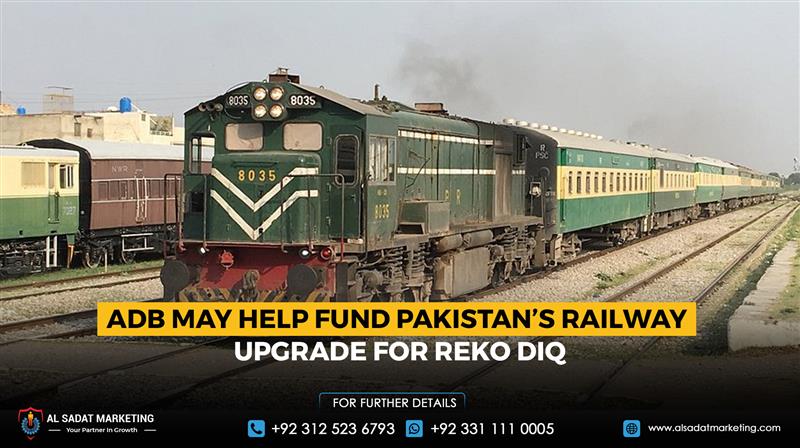The Asian Development Bank (ADB) is set to fund a major upgrade of Pakistan’s railway system after delays in Chinese financing raised concerns over the future of a key mining project. Sources confirmed that the ADB is in advanced talks to lead a $2 billion upgrade of a 500-kilometre section of the Karachi–Rohri railway line.
The upgrade is seen as urgent because the Reko Diq copper and gold mine, currently under development by Canada’s Barrick Gold Corporation, will rely on this route to transport copper ore to Karachi port. Without improvements, Pakistan risks facing a transport bottleneck as the old railway line is already under heavy pressure.
The project was originally part of the China-Pakistan Economic Corridor (CPEC), announced in 2015 under Beijing’s Belt and Road Initiative. Despite years of negotiations, no financing package has been agreed upon for the full 1,800-kilometre rail revamp, which was supposed to be the largest CPEC project. Meanwhile, Pakistan has struggled to repay loans for other Chinese-backed infrastructure and power projects.
According to sources, the ADB will lead an international consortium to finance the railway work. The bank is also expected to bring in a global engineering contractor through competitive bidding. The announcement of the deal is likely later this month, coinciding with a visit to Islamabad by ADB’s president.
Earlier this week, the ADB pledged $410 million in financing for the Reko Diq mining project itself. The $6.6 billion project is a joint venture between Barrick Gold and Pakistan’s federal and provincial governments. Production is scheduled to begin in 2028, with an expected annual output of 200,000 metric tons of copper concentrate. Over its 37-year lifespan, the mine could generate up to $70 billion in revenue for Pakistan.
Pakistan’s government has already secured support from the International Finance Corporation (IFC), which pledged $700 million, while talks are ongoing with financial institutions in the United States, Canada, and Japan.
Diplomatically, the shift from Chinese to ADB financing has been handled carefully. Officials stressed that the arrangement has been discussed with Beijing and will not affect ties with China, which remains Pakistan’s key strategic partner.
Alongside this, the United States has also shown interest in supporting Pakistan’s railway sector. In a recent meeting between Federal Minister for Railways Hanif Abbasi and US Chargé d’Affaires Natalie Baker, Washington reaffirmed its commitment to investing in modern railway infrastructure.
The railway upgrade will modernise tracks and bridges on the Karachi–Rohri line, allowing faster diesel trains and better freight handling. From Rohri, the line will connect to a branch coming from Reko Diq, enabling efficient transport of copper concentrate to Karachi port.
Security remains a concern for the Reko Diq project, as it is located in Balochistan, a province often targeted by insurgents. Ensuring the safety of both the mine and its railway supply chain will be critical for success.
With ADB stepping in and international interest growing, Pakistan’s mining and railway sectors may finally get the boost they need to support long-term economic growth.










